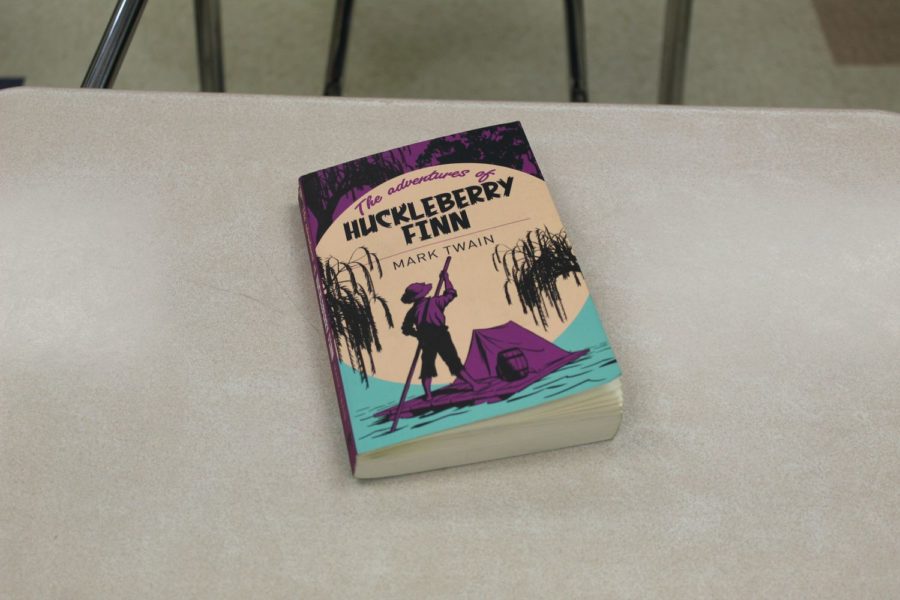Taught Or Not: Should Huckleberry Finn Continue Being Read In School?
The novel Huckleberry Finn has been the subject of much controversy due to its legacy in schools and the use of the “n-word” in reading the book.
The Adventures of Huckleberry Finn, written by Mark Twain, is widely recognized as a classic novel. It is taught in English classes throughout thousands of schools all across the world. However, The Adventures of Huckleberry Finn is somewhat of a controversial topic for some. Not only is it a great novel, but it also sheds light on what was happening in the 1800’s, and the reality of many people’s lives during this time period–especially concerning issues such as classism, slavery, and racism. It helps give readers a visual picture of what is going on throughout the era, and along with these images, come a large amount of controversy due to the harsh nature of the topic.
Many readers do not have an issue with reading this book in all its glory, but the other handful of people that think this book is too “real” for their children to be reading in school. Now, I do not use the word “real” lightly, but I used this term because I feel as if many people have an issue with how things really were, and the reality of the circumstances in certain situations throughout the novel. Many feel as if the book should not be taught in a school environment to prevent the readers from feeling pressured to say some of the language included in the novel, regardless of the language used paralleling that of its time.
I personally believe that the censored version of The Adventures of Huckleberry Finn should not be taught in school–only the original text should. Teens should never feel pressured to do something that is out of their comfort zone, and quite frankly, most of them know better than to not. But, the novel is not meant to offend anyone, nor is the language used in it: it is meant to teach people of how things were done and said in the 1800’s, as well as entertain readers by describing an excited story about a young boy and a runaway slave. It gives the readers an adequate idea of how life was for them, and the cruel reality many lived through. Part of this cruel reality was the language used against certain groups of people, which Twain emphasizes in the novel in order for it to be realistic, and an accurate representation of what life is like for the main characters. In a classroom, no one is forced to say or do something that is out of their comfort zone–they could simply choose to ignore, or blank out when reading audibly, a certain part of the text.
Lucy Soto, Alumni of California State University of Northridge, allowed me to poke at her in order to get an idea about how she felt while reading this book. She explained how she loved the novel, most notably because it provided her with the imagery necessary to visualize the scenes. Although she did enjoy the novel, she did not enjoy a lot of the language, as it made her feel a bit uncomfortable. However, she did not let this affect her overall experience reading the book: “I never felt pressured to step out of my comfort zone when it came to a class environment,” said Soto. According to Soto, she never felt pressured to say something in the book that was out of her comfort zone, and simply skipped over the parts she did not feel comfortable reading; then continued on with the novel.
Many forget the fact that they are allowed to say what they please, and not what they do not. It is all about personal preference. Everyone has a choice to do what they want, and many people forget that certain factor when discussing what should or should not be taught in classrooms. Although it is the students choice to read what they want, many parents have something to say about the issue in question, due to the fact that it is their loved ones going through said exposure to these topics.
Daniel Ruiz, parent a of Cam High student, explained how he felt indifferent about his children reading this book throughout all their high school years: “They are old enough to do as they please, but to make the right decisions while their at it.” Ruiz did not have an issue with the uncensored version of the book because each of his children know what they are and are not comfortable with doing/saying. He believes the idea that his children, and other children, should never feel pressured, especially in a school environment, to do something that they do not wish to do.
The Adventures of Huckleberry Finn shows us an important part in history. The 1800’s was filled with racism, slavery, and unfair justice to people of color. It is important that teenagers know this was a part of their history, and educate them on the topic. It demonstrates a crucial part of our American history. Without history, we would not be educated on everything that happened in the past. Students are taught this book because it has many hard, but necessary lessons in it, that show real life problems with racism and classism. It gives students an idea that everything was not equal before our time, and to this day, there is still a lot of inequality shown. Giving students the knowledge of the issues people would face years ago encourages them to identify patterns concerning modern racially charged issues, and prevents injustices from happening twice.
According to “The Harvard Gazette,” Huckleberry Finn is on the list as “one of the most challenging books to be taught.” Now, why is that? Mainly because of the harmful racial term used to describe people of color during this time. When Professor Jocelyn Chadwick was asked if this novel should be taught in school, she said yes, as long as it was brought upon the awareness of teachers how to teach it properly to students. Chadwick describes how, “Twain’s writings stopped being just stories and began to reflect his social conscience.” She made a very useful point saying that there is a big problem with race being discussed in today’s society, and literature is a way to bring those issues to light, in order to start up a conversation many people are not used to having.
Everyone will have their own opinion on the subject, but at the end of the day, it comes down to the maturity of the student and if they can handle reading a novel–and use the knowledge they accumulate for good–as intense and raw as Twain’s The Adventures of Huckleberry Finn.

Hello my name is Liliana Ruiz, I am a writer for the ACHS Stinger. I enjoy spending time with family, cooking, and painting.

















































































![Senior Ditch Day... Relaxation or Truancy? [Video]](https://achsstinger.com/wp-content/uploads/2017/10/IMG_7119-900x599.jpg)
![Heavy Rain Hits Cam High [video]](https://achsstinger.com/wp-content/uploads/2017/02/maxresdefault-900x506.jpg)



